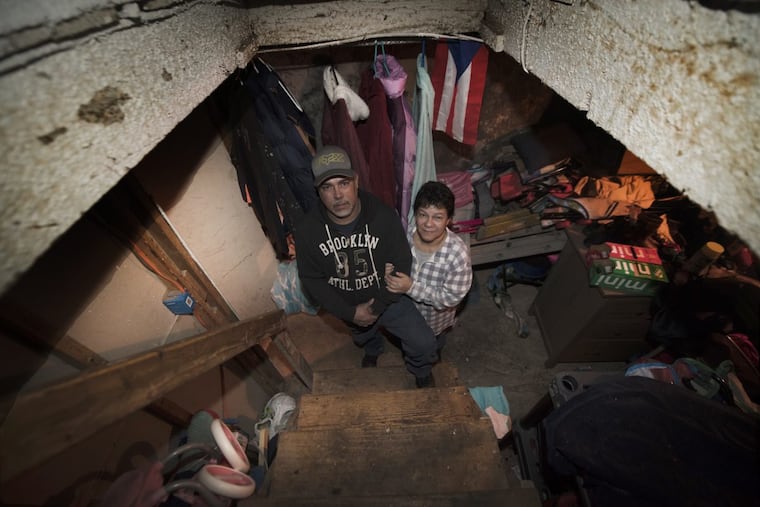Five Puerto Rican families who evacuated to Philly after Hurricane Maria to get 'special' housing
The Kenney administration has agreed to provide five subsidized homes to some of the Puerto Rican families who relocated to Philadelphia after Hurricane Maria. The decision comes after a heated meeting last month among advocates and city officials over the city's refusal to allow Puerto Rican evacuees to skip the line for public and subsidized housing.

Amid criticism from Latino groups that the city was doing too little to help Puerto Rican evacuees, the Kenney administration has agreed to make five more subsidized homes available for families who relocated to Philadelphia in the aftermath of Hurricane Maria.
The decision comes after the city's refusal to allow the evacuees to skip the waiting list for public and subsidized housing sparked a heated meeting last month of Councilwoman Maria Quiñones Sánchez, other Puerto Rican elected officials and community leaders, and Mayor Kenney and members of his cabinet.
"While the administration continues to have concerns about providing a special preference to Hurricane Maria's victims amid a housing crisis, considering the extreme need in some of these cases, the administration is willing to exercise its special preference with PHA where there are no other housing options," said Brian Abernathy, first deputy managing director.
Abernathy had previously said that allowing the evacuees to jump to the front of the line was not fair to the tens of thousands of people waiting for a home from the Philadelphia Housing Authority or to get into the authority's subsidized housing program. But after the Feb. 14 meeting, officials decided to ask the authority to provide housing for up to five evacuee families — 10 percent of what PHA rules allow the administration to refer. The families have to meet income requirements and other criteria.
More than 2,000 evacuees arrived in Philadelphia between the devastating Sept. 20 hurricane and Dec. 20, when the city's emergency disaster assistance center for hurricane evacuees closed. It's unclear how many arrived later. Many evacuees have struggled to get housing assistance from the Federal Emergency Management Agency and have been living in basements and cramped apartments due to what they say is unavailability of public housing.
For those who were on public housing assistance in Puerto Rico, PHA is willing to honor their vouchers for housing units here. The problem has been accommodating those who were not in a public housing program before.
PHA rules specify that in the event of a federally declared disaster, the authority can give "Super Preference" to any public housing applicants who have been displaced, as long as they meet income and other eligibility requirements.
In addition, a program called "Special Preference" empowers the mayor to refer up to 50 families for emergency rental assistance in cases of natural disaster or in "extreme emergencies." Aside from two Puerto Rican families who arrived shortly after the hurricane, the administration has not referred anyone.
News that the administration will make five more referrals was bittersweet to advocates for the evacuees.
"Many of us think that's a slap in the face. The welcoming city, right? You hear what people say, then you see what they do," Quiñones Sánchez said during a meeting with the Inquirer and Daily News editorial board Tuesday. "The fact that they came back with five, they understood that clearly they can't say no. Five is obviously not enough for us, but at least it gets us through a criteria and a process."
Abernathy said the criteria, or assessment of need, will be determined by the city's Office of Homeless Services.
"The true housing needs of these individuals are difficult to determine with the information that we have today," Abernathy said, adding that the city's homeless services office will assess family's needs and connect them to whatever resources they are eligible for.
Abernathy said Unidos Pa'PR, a coalition of various nonprofits created in the aftermath of the hurricane to raise relief funds, will refer families to the Office of Homeless Services to be assessed. He left the door open to allowing more than five families
"Should the need be far greater than what is known, we are willing to revisit this issue," he said.
The Rev. Bonnie Camarda, director of partnerships at the Salvation Army of Eastern Pennsylvania who was also at last month's meeting with the Kenney administration, said that five housing opportunities is better than none.
"I'm hoping we are moving forward to really help the crisis," she said.
Camarda is also on the board of the housing authority and said she plans to push the authority's president and CEO, Kelvin Jeremiah, on making use of the "Super Preference" option that doesn't require mayoral support, according to the authority's own rules.